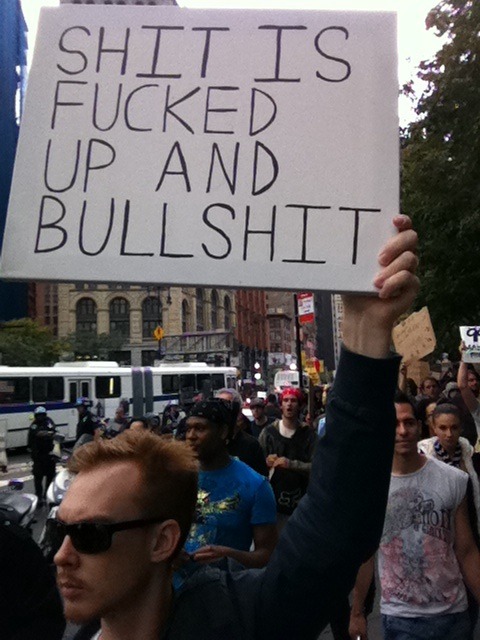Occupy Wall Street
 It's been a month since the start of Occupy Wall Street, and this hmbl blggr is still trying to wrap his head around What It All Means. Occupy has inspired over one hundred similar protests across the United States and the world, prompted some serious discussion of economic inequality, and made pundits say some very silly things (Greenwald has a pretty good summary).
It's been a month since the start of Occupy Wall Street, and this hmbl blggr is still trying to wrap his head around What It All Means. Occupy has inspired over one hundred similar protests across the United States and the world, prompted some serious discussion of economic inequality, and made pundits say some very silly things (Greenwald has a pretty good summary).
First off, why is everybody so angry? The hippie communists over at Business Insider have produced a series of 40-odd charts showing how unemployment has become permanent, corporate profits and the concentration of wealth have soared, and general wages have stayed flat over decades. I think we were all subconsciously aware of this, that something had gone profoundly wrong with the American Dream, but the Occupy movement is bringing it to the foreground.
And what is it that the Occupy movement wants? They've been castigated as radicals and anarchists who want society to give them a free lunch, but why don't we look at the actual data. Rortybomb performed an analysis on common phrases found in the We Are the 99% (essentially a web equivalent of the Occupy movement), and found that the key phrases were jobs, debt, work, children. In his analysis:
The demands are broadly health care, education and not to feel exploited at the high-level, and the desire to not live month-to-month on bills, food and rent and under less of the burden of debt at the practical level.How mundane, how depressing, but also how liberating. Once people realize where they stand in relation to the big institutions of power, banks and governments and the like, they might begin to think critically about how to free themselves. The 99% might be peasants, but they are peasants with smartphones. Compared to the masses of history, they are connected, informed, and possess political power.
The people in the tumblr aren’t demanding to bring democracy into the workplace via large-scale unionization, much less shorter work days and more pay. They aren’t talking the language of mid-twentieth century liberalism, where everyone puts on blindfolds and cuts slices of pie to share. The 99% looks too beaten down to demand anything as grand as “fairness” in their distribution of the economy. There’s no calls for some sort of post-industrial personal fulfillment in their labor – very few even invoke the idea that a job should “mean something.” It’s straight out of antiquity – free us from the bondage of our debts and give us a basic ability to survive.
Perhaps the single most impressive lesson of the Arab Spring is that power looks invincible until it no longer does, and once the hollowness at the core of power is revealed, the whole edifice can collapse with incredibly rapidity. Egypt, Libya, and Tunisia relied on brutal police repression and terror. The best that Wall Street can do is ruin our credit scores and empty out our 401Ks, and for the nearly 20% of Americans out of work, or the 45% of 16-29 year old unable to find a job, good credit and 401Ks were never in the offering. As with the Foreclosure Resistance Movement, it turns out that the system of debt has surprisingly little coercive power, and very little to offer to the 99%.
I do not have a crystal ball. The problems with the global economy are complex, systemic, and very difficult to resolve. There are no fast or easy solutions. Similarly, nobody knows what the end game of Occupy Wall Street is, or even if the protests will survive through the winter. But what I do know Occupy Wall Street is an opportunity for the 99% to figure out something new, some way of building social capital rather than financial capital.

The corporate profits chart is unfortunately not normalized by GDP. This is more like it: http://www.wolframalpha.com/input/?i=%28us+corporate+profits%29%2F%28us+gdp%29
ReplyDeleteNonetheless, a noticeable uptick in the 2000's.
Also, it says that 45% those 16-29 year-olds do not have jobs. The number that are looking for jobs but can't find them is more like 18%, which is above normal in about the same proportion as the overall unemployment rate. It seems like a lot of young people are going back to school, either out of a desire to learn or desperation.
I agree though, there is an amazing persistence to unemployment in this recession. It really sets it apart from past ones more than the actual levels seen.
I'll also say I'm somewhat surprised that I'm not hearing more about campaign finance reform, since that would seem to be relevant to many of the grievances being expressed.